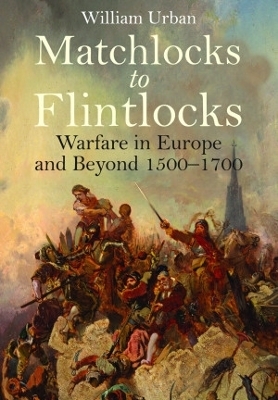
Matchlocks to Flintlocks
Warfare in Europe and Beyond, 1500-1700
Seiten
2023
Frontline Books (Verlag)
978-1-3990-2062-6 (ISBN)
Frontline Books (Verlag)
978-1-3990-2062-6 (ISBN)
A story of war and the persons and institutions that waged it during the two key centuries when warriors became soldiers and soldiers became servants of the state.
In the early modern world three dominant cultures of war were shaped by a synergy of their internal and external interactions. One was Latin Christian western Europe. Another was Ottoman Islam. The third, no less vital for so often being overlooked, was eastcentral Europe: Poland/Lithuania, Livonia, Russia, the freebooting Cossacks, a volatile mix of variations on a general Christian theme.
William Urbans fascinating narrative is an integrated account of early modern war at the sharp end: of campaigns and battles, soldiers and generals. Temporally it extends from the French invasion of Italy in 1494 to Austrias Balkan victories culminating in the 1718 Treaty of Peterwardein. Geographically it covers ground from the Low Countries to the depths of the Ukraine.
That narrative in turn focuses Urbans major analytical points: the replacement of crowd armies by professionals, and the professionals integration into crown armies: government-supervised, bureaucratised institutions. The key to this process was the mercenary. Originally recruited because the obligations of feudal levies were too limited, mercenary forces evolved operationally into skilled users of an increasingly complex gunpowder technology in ever more complex tactical situations. By the end of the seventeenth century, soldiers were identifying with the states and the rulers they served.
In the early modern world three dominant cultures of war were shaped by a synergy of their internal and external interactions. One was Latin Christian western Europe. Another was Ottoman Islam. The third, no less vital for so often being overlooked, was eastcentral Europe: Poland/Lithuania, Livonia, Russia, the freebooting Cossacks, a volatile mix of variations on a general Christian theme.
William Urbans fascinating narrative is an integrated account of early modern war at the sharp end: of campaigns and battles, soldiers and generals. Temporally it extends from the French invasion of Italy in 1494 to Austrias Balkan victories culminating in the 1718 Treaty of Peterwardein. Geographically it covers ground from the Low Countries to the depths of the Ukraine.
That narrative in turn focuses Urbans major analytical points: the replacement of crowd armies by professionals, and the professionals integration into crown armies: government-supervised, bureaucratised institutions. The key to this process was the mercenary. Originally recruited because the obligations of feudal levies were too limited, mercenary forces evolved operationally into skilled users of an increasingly complex gunpowder technology in ever more complex tactical situations. By the end of the seventeenth century, soldiers were identifying with the states and the rulers they served.
William Urban is the Lee L. Morgan professor of history and international studies at Monmouth College in Monmouth, Illinois. He is considered a leading expert on the Crusades and the Teutonic Knights. His many books include Bayonets for Hire and the highly acclaimed The Teutonic Knights.
| Erscheinungsdatum | 31.03.2023 |
|---|---|
| Verlagsort | Barnsley |
| Sprache | englisch |
| Maße | 156 x 234 mm |
| Themenwelt | Geisteswissenschaften ► Archäologie |
| Geschichte ► Allgemeine Geschichte ► Mittelalter | |
| ISBN-10 | 1-3990-2062-5 / 1399020625 |
| ISBN-13 | 978-1-3990-2062-6 / 9781399020626 |
| Zustand | Neuware |
| Informationen gemäß Produktsicherheitsverordnung (GPSR) | |
| Haben Sie eine Frage zum Produkt? |
Mehr entdecken
aus dem Bereich
aus dem Bereich
eine neue Geschichte des Mittelalters
Buch | Hardcover (2023)
C.H.Beck (Verlag)
CHF 53,20


